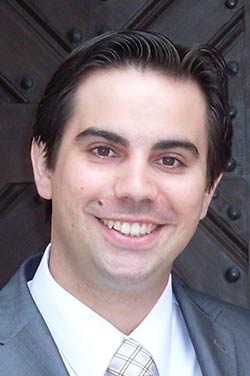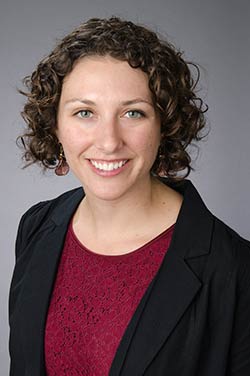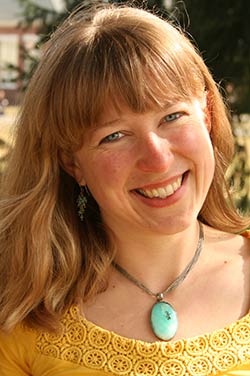
- About
- Postdoctoral Fellows
- Faculty Fellows
- News
Back to Top Nav
Back to Top Nav
Back to Top Nav

Dartmouth has named five scholars as the inaugural members of the Society of Fellows.
These rising scholars, representing the academic fields of history, sociology, geography, earth sciences, and physics, begin three-year fellowships on Sept. 1 and will continue through spring term of 2018.
Competition for the positions was strong, with more than 1,700 postdocs representing all PhD disciplines applying for the five spots.
The fellows, who have all completed or are working to finish PhD degrees, are: Caitano da Silva, who studied electrical engineering at Penn State University; Vanessa Freije, a historian from Duke University; Katharine Kindervater, whose field is geography and has her degree from the University of Minnesota; Bess Koffman, who studied earth and climate sciences at the University of Maine; and Yvonne Kwan, a sociologist from the University of California, Santa Cruz.
The appointments come 18 months after President Phil Hanlon '77, in his inaugural address, announced the creation of the Society of Fellows, noting that the program is part of his vision to bring “intellectual energy and the excitement of new ideas” to campus.
President Hanlon this week called the fellows "truly exceptional."
"They will bring their passion for scholarship to Dartmouth, where they will work with faculty mentors, develop their skills as teacher-scholars, and take with them the best of what they discover at Dartmouth as they go on to distinguished careers," he says.
The postdoctoral fellows will pursue their own research while gaining mentored experience as teachers and members of the departments and programs they will join, says Provost Carolyn Dever.
"The fellows program benefits Dartmouth by complementing existing curricula with the postdocs’ expertise in underrepresented fields. These young scholars will offer Dartmouth students a vision of the excitement and vitality of the life of the mind. They will offer our faculty the resources of fresh scholarly perspectives and early-career innovation," Dever says.
The Andrew W. Mellon Foundation provided initial funding of $1.25 million for the program and the College is seeking an endowment to ensure the perpetuity of the Society of Fellows.
In September, Hanlon named seven members of the Dartmouth faculty to serve as mentors to the Society of Fellows scholars. These first faculty fellows are Professor Randall Balmer, chair of the Department of Religion, who will serve as the society’s inaugural director; Kathryn Cottingham, a professor of biological sciences; Pamela Kyle Crossley, the Charles and Elfriede Collis Professor of History; Peter Golder, a professor of marketing at the Tuck School of Business; William Lotko, the Sue and John Ballard ’55, TT ’56 Professor of Engineering at Thayer School of Engineering; George O’Toole, a professor of microbiology and immunology at the Geisel School of Medicine; and Donald Pease, the Ted and Helen Geisel Third Century Professor in the Humanities, and a professor of English.
Balmer says he's excited about the arrival of this first class of young fellows.
"I’m especially pleased about the diversity of this inaugural class of postdoctoral fellows," Balmer says. "My hope is that, individually and collectively, they will both benefit from and contribute to the intellectual discourse here at Dartmouth. The Society of Fellows offers a rare opportunity to enrich scholarly life across the campus, and my colleagues and I will do everything we can to nurture that process."
The fellows will participate in the activities of the society, including presenting their own work through society-sponsored symposiums and events. They will hold appointments as non-tenure-track lecturers in a department. They will teach one course during two academic years, and will be in residence for the fall, winter, and spring terms, and during one of two summer terms. Fellows will receive a stipend and will participate in pedagogical training through the Dartmouth Center for the Advancement of Learning (DCAL).
More about the new fellows:

Caitano da Silva's dissertation, “Numerical Modeling of Leader Discharge Mechanisms in Lightning, Blue Jets, Gigantic Jets, and Sprites,” advanced the understanding of how lightning channels, called “leaders,” form inside thunderclouds and propagate tens of miles in the atmosphere. Da Silva's research combines a wide variety of experimental data in atmospheric and space sciences with novel computational models to unveil the electro-dynamic coupling between thunderstorms and the upper atmosphere. At Dartmouth, he plans to investigate the impact of thunderstorm-generated energetic electrons, X-rays, and gamma-rays in the near-Earth space environment.

Vanessa Freije's dissertation, “Journalists, Scandal, and the Unraveling of One-Party Rule in Mexico, 1960-1988,” analyzes political scandals during the final decades of Mexico’s one-party rule, arguing that print journalism not only reflected elite dissent but also sharpened internal party divisions that eventually led to organized opposition against the PRI, the ruling state party. At Dartmouth, she plans to continue her research into the unexpected relationship between free speech and democracy through interdisciplinary scholarship spanning anthropology, history, and communications.

Katharine Kindervater's dissertation, “Lethal Surveillance: Drones and the Geo-History of Modern War,” examines the historical development of drone technology from the start of the 20th century to the present in order to understand the significance of the increasing centrality of drones in American military engagements and security practices more generally. At Dartmouth, she plans to develop one of the arguments of her dissertation—that the drone reflects intersecting histories of modern scientific development and Western violence.

Bess Koffman currently works at the Lamont-Doherty Earth Observatory of Columbia University, where she holds a National Science Foundation Postdoctoral Fellowship in Polar Regions Research. Her dissertation, "Atmospheric Dust Deposition in West Antarctica Over the Past Two Millennia,” examines changes in Southern Hemisphere wind patterns and climate, as well as past volcanic eruptions. She is interested in understanding how and why Earth’s atmospheric circulation changes through time, and the effect these changes have on the ocean-atmosphere exchange of carbon dioxide. At Dartmouth, she will continue investigating the causes of past changes in climate and wind patterns by analyzing the composition and particle size distribution of atmospheric dust deposited over time on polar ice sheets and mountain glaciers.

Yvonne Kwan's dissertation, “Encountering Memory and Trauma: Transgenerational Transmission of Trauma in Cambodian Americans,” explored the ways in which trauma and violent histories were transmitted from one generation to the next, "particularly via affect and the older generation’s use of narrative fragments, caesuras, and/or silences," she says. At Dartmouth, she plans to continue her exploration of the influence of transnational legal and racial politics on the mental health and education of disadvantaged groups.